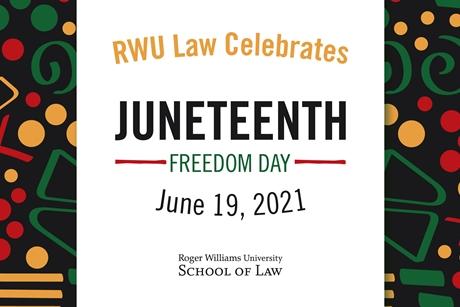A Juneteenth Message from the Dean
‘Many people in our country acknowledge Juneteenth as a celebration of freedom—and it is that. Yet this date is also a reminder of deferred justice for those who continue to chase true freedom.’

This Saturday we mark Juneteenth. As a law school located in Bristol, Rhode Island, it is important for all of us here to reflect upon the town in which our institution resides—and where many of us (myself included) have chosen to make our homes. The Town of Bristol is visually breathtaking, with a classic, small-town New England feel and stunning maritime vistas at every turn. Yet the history of this municipality, and this region in general, has prompted me to reflect—upon my role as dean, upon our law school’s responsibility to the people of Rhode Island, and upon the role that we as lawyers play in this country. These reflections have led me to a deeper appreciation of our collective responsibility to both acknowledge the wrongs of the past, and build a better and more just future.
The oldest Fourth of July Parade in the United States takes place here in Bristol each year. The inherent dissonance of this moment, however, is not lost on me. As early as 1785, patriotic exercises were being held in Bristol to commemorate the Revolutionary War—and yet, even as these celebrations were taking place, the DeWolf family was securing its position as one of the largest slave-trading families in the country. When I walk along Bristol’s streets, I know and recognize that many of the historic structures I see once served as warehouses for Black bodies and banks for slave-trade money; and that many of the lavish homes I pass were built with this money—and by enslaved labor. These structures, and these injustices, are also part of our country’s shared legacy.
Juneteenth is the anniversary of the delayed announcement, on June 19, 1865, to enslaved Black people in Texas, that the Emancipation Proclamation had been signed by President Abraham Lincoln two and a half years earlier. Many people in our country acknowledge Juneteenth as a celebration of freedom—and it is that. Yet this date is also a reminder of deferred justice for those who continue to chase true freedom.
It is important for us to remember this deferral of justice, because our country continues to live amid the pernicious fallout of Chattel Slavery. In the 156 years between that day in 1865 and today, we have witnessed repeated and ongoing deferrals and denials of justice, and of life itself, to Black People. We have seen the rise and fall of Jim Crow. We have seen white residents of Tulsa, Oklahoma, torch the prosperous Black community of Greenwood because its very prosperity was viewed as a threat. We have seen the Civil Rights movement swing the pendulum in one direction, and the assassinations of Rev. Dr. Martin Luther King, Jr., Malcolm X, Fred Hampton, Medgar Evers, and countless others cause the pendulum to swing back.
Today, with the public taking of so many Black lives still filling news headlines on a daily basis, people in our country—and around the world—are calling out this long-overdue delay in justice to the Black community and other communities of color. In the past year alone, we have watched the deaths of George Floyd, Breonna Taylor, Ahmaud Arbery, and more than 180 other Black lives. We have seen Latinx children detained at our southern border, caged and separated from their families. And we have watched a mass-shooting in Atlanta that targeted Asian-American women.
Make no mistake: the presence of white supremacy is pervasive and systemic, and all of us must work to eliminate its damaging effects. It is embedded in our systems of law, justice, policing, housing, and education. We must acknowledge it, see it, and change it together, for the good of everyone. The ability of Black people to live and thrive in freedom is intimately tied to the well-being of our entire society. In the words of Rev. Dr. King, “Injustice anywhere is a threat to justice everywhere.”
